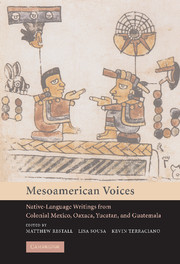Book contents
- Frontmatter
- Contents
- List of Documents and Images
- Preface and Acknowledgments
- Colonial Mesoamerica
- PART ONE
- PART TWO
- 3 Views of the Conquest
- 4 Political Life
- 5 Household and Land
- 6 Society and Gender
- 7 Crime and Punishment
- 8 Religious Life
- 9 Rhetoric and Moral Philosophy
- Glossary
- References and Readings
- Index
6 - Society and Gender
Published online by Cambridge University Press: 05 October 2014
- Frontmatter
- Contents
- List of Documents and Images
- Preface and Acknowledgments
- Colonial Mesoamerica
- PART ONE
- PART TWO
- 3 Views of the Conquest
- 4 Political Life
- 5 Household and Land
- 6 Society and Gender
- 7 Crime and Punishment
- 8 Religious Life
- 9 Rhetoric and Moral Philosophy
- Glossary
- References and Readings
- Index
Summary
Native societies of Mesoamerica were complex and stratified. Distinctions based on gender, class, and status determined a person's rights, privileges, and roles. Mesoamerican societies were generally divided into two hereditary groups: nobles and commoners. Within these two broad categories there were variations in wealth and status, and in occupations and obligations. Nobles possessed much of the permanent wealth, held high offices, dominated the arts of war, and enjoyed numerous privileges by virtue of their elite status. Normally, they represented roughly ten percent of the indigenous population. Because status was hereditary, a noble was theoretically the child of a lord and, therefore, a descendant of a noble lineage with its own palace, lands, and dependents. The hereditary ruler, called a cacique by Spaniards (derived from an Arawak word for ruler which Spaniards adopted in the Caribbean), was the highest-ranking noble.
Elites paid taxes on the basis of their extensive lands, but they were exempt from participating in the rotary draft labor system. Rather than performing manual labor to fulfill their tribute obligations, nobles served the community by holding religious and civic offices. Men and women of the commoner class paid taxes in goods and provided labor to the nobles in exchange for access to land. For example, women often spun cotton into thread or wove cloth as part of their tribute payments. Commoner men labored on agricultural lands and construction projects, and they served in the military.
- Type
- Chapter
- Information
- Mesoamerican VoicesNative Language Writings from Colonial Mexico, Yucatan, and Guatemala, pp. 126 - 157Publisher: Cambridge University PressPrint publication year: 2005

